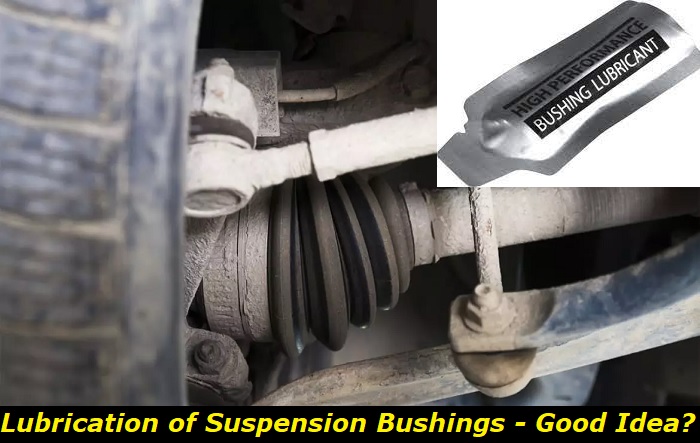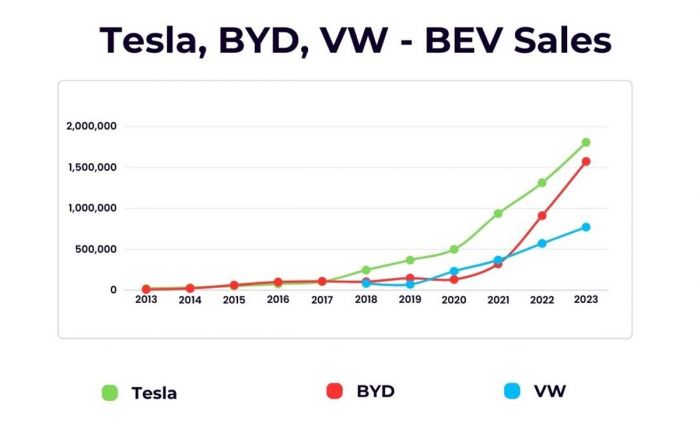Proper application of lubricants can help reduce friction, prevent wear and tear, and prolong the lifespan of the bushing. If the squeaking persists even after lubrication, you might have to look towards alternative options such as bushing replacement.
Front suspension problems highlights
- Level of importance:high
- Common reasons:road potholes, speed bumps, age, mileage
- DIY inspection:possible but complicated
- DIY repair:usually,impossible
- Average price in shops:$250 - $800
- Average time:2 - 8 hours
- If ignored:fatal failure, no drive, expensive repairs

Understanding The Role Of Bushings
Before we jump into the best lubricant for squeaky bushings, we first need to understand the role of bushings. So what exactly is a bushing? Bushings are mechanical components that are placed between two moving components. They facilitate smoother movement between these components while reducing friction. Basically, they act as a buffer between two moving metal parts, absorbing vibrations and impacts and preventing metal-to-metal contact which may lead to premature wear.
Automotive manufacturers use various materials to manufacture these bushings. Rubber is one of the common materials used to manufacture bushings. Made of either synthetic or natural rubber, they are widely used for their ability to dampen vibrations and noise effectively. And they are also cheap to manufacture. Their only drawback is that they wear out relatively quickly.
Other popular materials include polyurethane, bronze and metal bushings. Bronze and metal bushings are used in heavy-duty applications, offering excellent load-bearing capabilities and stability. Due to their ability to withstand immense pressure and extreme condition, metal bushings are a popular choice for trucks and other commercial vehicles.
What Causes Squeaky Bushings
Okay, so you are hearing squeaking noises out of your bushings. So, you decide to get them lubricated. But does lubrication actually help? Will lubrication solve squeaky bushings? For that, you need to first look at what caused the squeaky bushings in the first place.
More often than not, if you've got a squeaky bushing, it is due to a lack of lubrication. Lubrication reduces the friction between the surfaces which allows them to move smoothly. Without it, the friction between the parts increases, which will lead to annoying squeaking noises.
Another possible reason is wear and tear. Bushings undergo constant stress and strain while supporting the weight and absorbing bumps on the road. Over time, this will result in the bushings wearing off. So, they lose their ability to dampen vibrations effectively which increases the likelihood of squeaking noises.
Dust and dirt accumulation can also cause squeaky bushings. Once dirt is accumulated around the bushings, it increases the friction, which leads to squeaks when the suspension components interact.
It's important to be cautious when installing bushings, as an incorrect installation could be the cause of those bothersome squeaky sounds. This is because it may result in misalignment or incorrect pressure distribution. Additionally, when replacing bushes, it's essential to choose high-quality replacements. Low-quality bushings may wear out too soon, which can contribute to the squeaking sounds.
Importance Of Proper Lubrication
Lubrication plays a huge role in the longevity of the bushings and in dealing with those pesky squeaks. Here's why proper lubrication is vital for your bushings,
1) Prevention Of Premature Wear
Lubrication significantly reduces the friction between the bushings and whatever is in contact with it. Without lubrication, the bushings will heat up due to friction and wear off rapidly. Over time, the bushings will become stiff and lose their ability to absorb shocks. The lubricant you apply over the bushings can basically eliminate this problem. This lubricating film reduces the friction significantly, allowing the bushings to glide smoothly during suspension movements. Lubrication will allow you to extend the life of your bushing by minimizing friction-related damage.
2) Noise Reduction
Will lubrication help with squeaky bushings? It certainly will, at least if you address it at the right time. Squeaky bushings are a common annoyance for drivers and passengers alike. This again comes down to the friction. Friction creates not only heat but also noise. So using lubrication significantly reduces the chances of bushings producing irritating noises during vehicle operation.
3) Better Handling
The suspension not only makes your ride more comfortable, but it also has a huge say in its handling. As mentioned, lubricating the bushings help suspension components move freely. By ensuring smooth movement, the suspension system can respond more efficiently to road irregularities, providing better stability and control during cornering and braking. Thus, well-lubricated bushings can improve overall performance and vehicle handling.
4) Protection From Impurities
Remember we mentioned how dust and dirt accumulation can lead to squeaky bushings? Lubrication can help with that too, as it creates a layer above the bushings. Thus, they can shield the bushings from dust, dirt, water, and other environmental factors.
Best Lubricant For Squeaky Bushings
If you are searching for lubricants for your bushings in a store, the number of options available can be overwhelming. With all these brands labeling that they've got the best lubricant for squeaky bushings, which one do you choose?
Before you start looking at brand names, first you need to focus on getting the right type of lubricant. Yes, there are various types of lubricants, and each has its own advantages and disadvantages. Let's analyze the popular types of lubricants available in the market.
1) Silicone Based Lubricants
As the name suggests, this is the type of lubricant formulated using silicone as the primary base material. Silicone is a synthetic polymer known for its ability to withstand extreme temperatures, thus making it a popular choice for automobile lubricants. They can perform well under hot and cold temperatures without losing effectiveness. Silicone doesn't break down easily, so another advantage of silicone lubricants is that they are long-lasting. Silicone lubricants also offer water-resistive properties, which protect your bushings from moisture.
But beware silicone lubricants don't work with all bushings. If your automobile uses polyurethane bushings, silicone-based lubricants are not the way to go. When applied on polyurethane bushings, silicone-based lubricants are significantly less effective and will require frequent lubrication. Silicone-based lubricants are also more expensive compared to other options.
2) Lithium Based Lubricants
Lithium-based lubrication is one of the popular lubrication choices when it comes to automobiles. This type of lubricant is actually more versatile than silicone-based lubricants as they are compatible with any type of bushing material including polyurethane. And they also do a good job lubricating as they can effectively reduce friction and ensure smooth operation. Compared to silicone-based lubricants, lithium-based lubricants are also much more affordable which is one of the main reasons for their popularity. Due to the demand, lithium-based lubricants are also widely available in stores and online.
The main drawback of lithium-based lubricants is their lower temperature resistance. As soon as the temperature hits extreme numbers, be it hot or cold, lithium-based lubricants will start to degrade, losing their effectiveness. Thus, you might also have to frequently re-apply lubricant to ensure your bushings are properly lubricated. This type of lubricant is not as long-lasting as silicone-based lubricants either.
But this doesn't mean that lithium-based lubricants are a bad option. If you don't encounter scorching summer heat or freezing winters where you live, lithium-based lubricants are actually a decent option to go with.
3) Polyurethane Lubricant
Just like polyurethane bushing, you can also find polyurethane lubricants. Polyurethane-based lubricants are a specialized type of lubricant specifically formulated to provide optimal performance with polyurethane bushings.
As this is customized for polyurethane bushings, it offers superior adhesive properties on polyurethane surfaces. This adhesive property keeps the lubricant in place for a longer period of time. Polyurethane lubricants are also highly effective at noise and vibration reduction. The reduced friction and improved damping characteristics of these lubricants can lead to better vehicle responsiveness and more precise handling.
Obviously, the biggest drawback of polyurethane lubricants is their limited applications. They are only effective on polyurethane bushings, so you can't use them on just any vehicle. This also makes them harder to find. They only cater to a fraction of the market compared to other lubricants, so they aren't as widely available.
4) Grease Based Lubricants
If your vehicle uses metal or brass bushings, grease-based lubricant is the best choice for you. Grease is a semi-solid lubricant composed of a base oil and a thickener. The semi-solid nature of grease-based lubricants also ensures it sticks to a surface for a longer period. Grease-based lubricants also have a higher load-bearing capacity.
Probably the most important property of grease-based lubricants is their ability to prevent corrosion. Unlike rubber or polyurethane, metal bushings are prone to corrode. Grease can effectively protect your bushings from corrosion.
Just like any other lubricant, grease also has its disadvantages. The texture of grease can trap dirt, dust, and other impurities. So, over time, it tends to get impure and slowly starts to lose its lubricative properties. They also don't flow like some other lubricants making them harder to apply to tight spaces or intricate components. Though grease can withstand extremely low temperatures, that's not the case with high temperatures. In extreme heat, grease may melt or thin out losing effectiveness.
Will Lubricant Help Against Squeaky Bushings?
If you've got squeaky bushings, lubricant is definitely the way to go. But you need to apply lubricant as soon as you hear squeaking. If not, your bushings will wear off. Once your bushing is worn off, no amount of lubricant can help and the squeaking will persist. And the only option would be to replace your bushings.
Also when applying lubricant, make sure to choose the right type. By selecting the appropriate lubricant for specific bushing materials, such as silicone-based lubricants for rubber bushings and grease-based lubricants for metal bushings, car owners can optimize the performance and longevity of these critical components.
About the authors
The CarAraC research team is composed of seasoned auto mechanics and automotive industry professionals, including individuals with advanced degrees and certifications in their field. Our team members boast prestigious credentials, reflecting their extensive knowledge and skills. These qualifications include: IMI: Institute of the Motor Industry, ASE-Certified Master Automobile Technicians; Coventry University, Graduate of MA in Automotive Journalism; Politecnico di Torino, Italy, MS Automotive Engineering; Ss. Cyril and Methodius University in Skopje, Mechanical University in Skopje; TOC Automotive College; DHA Suffa University, Department of Mechanical Engineering






Add comment